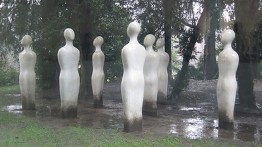Remote Lecture | Andrea Simitch: Context Matters - Pedagogy in an Expanding Landscape
Thursday, April 23, 2020, 6:30 - 8:30pm

Fausto Melotti The Seven Sages PAC Milano 1981
The making of architecture is dependent on a critical translation of context - one that informs the production of INFORMED FORM: work that has the capacity to engage in distinct forms of dialog with the contexts in which it is located. As educators we must demand a deep reading of context to establish the terms of dialog: to understand where architecture comes from (through studying its cultures and histories), what motivates it (its theories and environments) and what contributes to its production (its technologies and representations).
Andrea Simitch is the Stephen H. Weiss Presidential Fellow and Chair of the Department of Architecture at Cornell University. She teaches courses in architectural design, architectural representation, and furniture design.
Simitch served as Director of the Bachelor of Architecture program from 2011–14, as Director of Undergraduate Studies from 2007–08, and as Associate Dean of AAP from 2002–03. She has been a panelist on the New York State Council on the Arts, a department representative for the Cornell Council for the Arts, and was a faculty collaborator with the Andrew Goldsworthy workshop at Storm King. Val Warke and she partner in a collaborative architectural practice and recent projects include the Seneca House as featured in Architectural Record, Nalati National Park Resort and the Eco-Tourism Strategic Planning Proposal, both in Nalati, PRC, as well as numerous collaborative design competitions that include the Arbedo Castione school in Ticino, Switzerland, the Center for Promotion of Science of the Republic of Serbia Competition, Benetton Competition "Designing in Teheran”, and the Stockholm City Library Competition.
Simitch has taught extensively for Cornell in numerous international venues that include Europe and Central and South America and is regularly invited to lecture and participate in diploma juries and symposia at peer institutions, most recently in Italy, Spain, Sweden and Switzerland. She has recently delivered the keynote lecture at the Architecture Society of China Annual Meeting in Shanghai as well as the keynote lecture at the School of Architecture, China Academy of Art's Architectural Education Leadership Forum in Hangzhou. She is also an advisory board member for ARCHITECTEM, an architecture platform based in Dubai. Student work from her furniture design course has been exhibited at the International Contemporary Furniture Fair in New York. She was a 2015 Fellow at the Baer Art Center in Hofsós Iceland. The Language of Architecture: 26 Principles Every Architect Should Know, a book she co-authored with V. Warke and published by Rockport Publishers (June 2014) has been translated into seven languages. She received her B.Arch. from Cornell in 1979 and also attended Occidental College and l'École Spécial d'Architecture in Paris, France. In 2017 Design Intelligence (DI) named her one of the 25 Most Admired Educators.
This remote presentation is free and accessible to the public.
View the full Spring 2020 Lectures and Events List.




